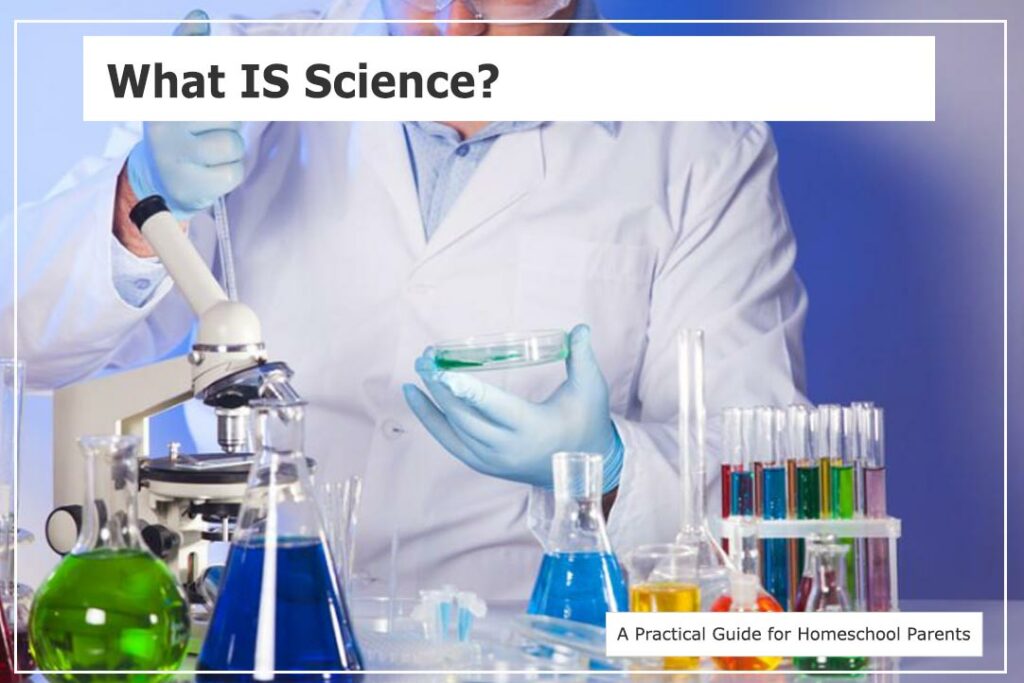What Is Science?
A Practical Guide for Homeschool parents
Science isn’t just a classroom subject or a list of facts—it’s a way of exploring the unknown. It’s not about what we already know but about how we approach what we don’t know. Science is an active process, something you do. It happens when you ask questions, seek answers, and work to make sense of the world around you.
The Purpose of Science
At its core, science is a tool for asking questions and finding answers. The Scientific Method is just one way to organize this process, but it’s not the only method. Scientists and engineers use many approaches to sift through information and solve problems. In our program, we’ll explore these methods and highlight the ones most commonly used in the real world.
The Method Behind the Madness
Doing science isn’t about sitting around debating how things might work—it’s about testing ideas through experiments. You must be able to measure your results, and others must be able to replicate them. While this might seem like common sense, it wasn’t until the 1500s that Tycho Brahe suggested doing experiments instead of just arguing about theories.
Science helps us uncover what we know and reveals what we don’t know—and often, the gaps in our knowledge are the most exciting parts.
Breaking Science Down:
The Big Three Questions
Science often starts with three fundamental questions:
- What IS it? What is it made of? What does it look like? How does it behave? (This is where we describe things.) Example: Your child might pick up an insect and start to describe what they see initially.
- How does it work? What is the chemistry or physics behind it? Why does it behave and interact the way it does? How does it move? Your child might continue to observe eating and sleeping habits, how it obtains and processes food, how it makes more of itself.
- How does it change over time? How did it begin? How has it changed or developed? How does it end? How is it different when it's brand-new versus near the end of its lifetime, and any significant changes it goes through?
Here’s the kicker: most things in science don’t have answers to all three questions yet! That’s why science isn’t just about learning—it’s about unlearning things we thought we knew.
Challenging What We “Know”
A big part of science is rethinking what we believe to be true. As Mark Twain said:
“It ain’t what you don’t know that gets you into trouble. It’s what you know for sure that just ain’t so.”
Science constantly challenges old ideas, even ones that were considered “absolute truths” for centuries.
Here are a few examples:
- The Sun revolves around the Earth.
- The ocean is bottomless.
- There’s no life in Antarctica.
- The Earth is flat.
As history has shown, unlearning what we think we know is just as important as discovering new truths.
The Universe Is Vast—But Understandable
One of the most amazing things about the universe is that, despite its vastness, we can make sense of it. As Albert Einstein famously said:
“The most incomprehensible thing about the universe is that it is comprehensible.”
That doesn’t mean science is easy at first. When you’re just starting, it might feel awkward, challenging, and even strange. But remember:
“It will seem difficult at first, but everything is difficult at first.”
~ Naomoto Musashi
Learning science is like learning any new skill—it takes time, patience, and practice.
Stick With It—It’s Worth It
Some of the ideas we’ll cover might seem unfamiliar or even counterintuitive. (Wait, lightning can strike the same place twice?!) But if you stick with it, you’ll start to notice things “clicking” into place. You’ll gain a deeper understanding of not just the rules of the universe but how to think critically and question new ideas.
Science isn’t just about learning—it’s about growing. It’s about discovering the tools to navigate the world with curiosity, confidence, and creativity.
Let’s dive into the process together and unlock the secrets of the universe—one question at a time.
the fundamental premise of Science
One of the fundamental premises in science is that the universe is understandable—that its phenomena can be observed, studied, and explained through systematic inquiry and logical reasoning.
This idea is often referred to as the principle of comprehensibility or scientific intelligibility.
Why Is This Premise Important?
- Basis for Scientific Inquiry: The belief that the universe operates according to consistent, discoverable laws underpins all scientific investigation. Without this assumption, attempting to understand or predict anything would seem futile.
- Predictability of Natural Laws: Scientists assume that the same laws of physics, chemistry, and biology apply universally and that these laws are not arbitrary but can be discovered and understood through careful observation and experimentation.
- Connection to Mathematics: The premise aligns with the remarkable effectiveness of mathematics in describing natural phenomena.
- Encourages Progress: It fosters optimism that even complex mysteries, like the origins of the universe or the nature of consciousness, can eventually be unraveled.
Practical Evidence of Comprehensibility
From Newton's laws of motion to quantum mechanics, the success of scientific theories in predicting and explaining phenomena reinforces this premise. For example:
- The discovery of DNA as the blueprint of life.
- The use of general relativity to predict phenomena like black holes.
- The development of vaccines based on our understanding of biology and immunology.
While not everything is fully understood (and some mysteries may remain unresolved for a long time), the belief in an understandable universe is a cornerstone of the scientific endeavor and drives the continued search for knowledge.
Just Enter Your Email To Receive
5 Free Hands-On Science Lessons!

Just enter your email and you’ll get instant access to this complete mini-science curriculum.
This free sample program includes:
See how easy it can be for you to go from “Frustrated” about not having enough time or resources for Science… To “Fascinated” by how your kids learn science better than EVER before because now they’re enjoying it!



